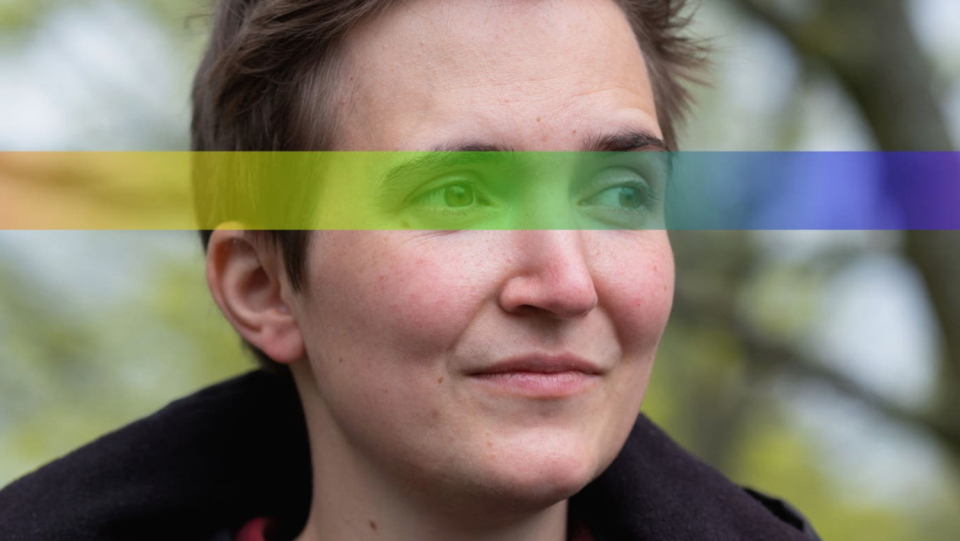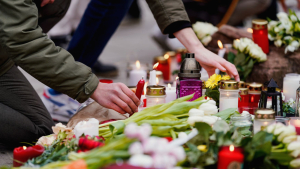Sabeth Blank hurries through the city gate on Cologne's Chlodwigplatz, up the Severinstrasse, past a homeless and a Lebanese restaurant. The soles expired, the Schuhleder full of cracks, dashes them over the asphalt.
Blank is not often in the southern city of Cologne, but Porz, where she has been living in a garden hut for a few months, is not appropriate for her to tell her story.
Blank has short hair, a rough voice and two searching eyes. If you don't know that she is a woman, you could think she is a man. This often happens at the technical university where she studies information and communication technology.
Then Blank found the café she was looking for. She orders a cappuccino and begins to tell, just as quickly as she runs through the streets.
It is the story of a girl who grew up in the Bavarian province, wore boys' clothes, fell in love with her best friend and at some point believed to be in the wrong body. Blank made a transition. But then the doubts came.
Where to start in this story? Maybe with the cuts.
Haden instead of happiness after the trans-surger
Whether the incisions should be large or small, she was asked only an hour before the operation, says the 28-year-old. An hour before the doctor drove the scalpel into the skin of her chest, scraped out the glandular tissue and removed the connective tissue skin. An hour before he first removed her nipples and then put them back on.
The operation of her breasts, the mastectomy, took place in 2016. At that time Blank decided to make the big cuts. It looks better, she was told. Absurd. laughter. She squeezes it out, slightly hoarse.
When Blank woke up after the operation, her left chest hurt. Instead of being happy, as she had been told, she struggled. The pain became stronger the following night. The doctor had to open the cut and drain blood. Because it still hurts, blank leans her hand on the thigh while she tells her story in the café of the Südstadt Cologne.
"For me, the transition was wrong," says Blank. Let others know that. And it is here at the latest that Blank's story becomes explosive, because it is part of a debate that is being conducted with increasing intensity. Anyone who questions whether a transition is always the right thing to do is quickly denounced as trans-hostile.
The reason: To this day, people are discriminated against whose biological gender does not match their perceived gender. Those affected in turn find it degrading when psychiatrists ask them intimate questions so that they can change their civil status.
The International Statistical Classification of Diseases and Related Health Problems (ICD) serves as an overview of diagnoses worldwide. In 2022, the eleventh edition, ICD-11 for short, came into force. It contains significant changes for trans persons:
Important to know: the ICD-11 is not yet used in Germany. It must first be translated, modified and integrated into the existing structures here in land. Doctors are currently working with the ICD-10 GM version 2022-GM stands for »German Modification«. How long it takes for the ICD-11 to be used in Germany is unclear. However, it will be more than months.
With the ICD-11, indications for somatic treatments in trans* persons should continue to be medically justified if, for example, it is assumed that without this, the health quality of life of the affected person will be permanently impaired.
"It is an important signal that the gender incongruity is no longer understood as a mental disorder," says youth psychiatrist Georg Romer. Because being a trans is therefore no longer a disease by medical definition. This could help transpersonen to be recognized in their gender identity and should counteract prejudices.
Gender dysphoria is characterized by a strong, persistent cross-gender identification. It can be accompanied by anxiety, depression, irritability. Also, sufferers often have a desire to live as a different gender from the one assigned at birth.
In Germany, an S3 guideline for diagnostics, advice and treatment regulates how to deal with gender incongruity, gender dysphoria and trans health. It dates from 2019, but already takes into account the desired changes to the ICD. A revision is planned for 2023.
Many transpersonen appreciate gender adjustment
The question of whether gender is socially constructed or whether it is specified by biology polarizes society. Some see a "trans-hype" in cases like Sabeth Blank. More and more young people and young adults would change gender. In particular, girls are not only increasingly breaking their gender role, they simply changed. The gender is often not the cause of their discomfort. It is childhood trauma, stress disorders, homophobia or strict gender stereotypes that the young people do not correspond.
There have always been gender diversity, the others countered. There are no longer affected, they are just more visible than before. Because transpers are now more recognized, they dealt with it more openly. And because there were more role models, more people dared to adapt their gender. The number of operations increases. That of the persons who reversed gender adjustment - called the detranzer - is considered to be negligible.
In fact, this number is hardly covered. Various examinations appreciate 0.5 to 2 percent. Blank is convinced that they are more. In Germany, she is in contact with a good 20 people. And anyway: "May I not tell my story just because we are not that many?"
She suffered, was anorexic and depressed
Sabeth Blank grew up in Erlangen. She climbed on trees, played guitar and basketball. Blank was often asked whether she was a girl or a boy - so often that at some point she no longer knew it herself. She asked her mother and she said: "Of course you are a girl." That gave her peace.
In school, Blank did not accept many things as given. She questioned what the teachers called truth. So she was alone. Criticism was generally not welcome: When the school newspaper wanted to publish a controversial article, the rector quickly closed the entire editorial office.
At the age of eleven, Blank fell ill with anorexia. She argued with her mother, who had depression and was overwhelmed by her job as a social worker. Her father stayed out. "I didn't get any support at home," says Blank.
She fell in love with her best friend, but did not dare to tell her. Anyone who was a lesbian in the Bavarian province had to be a pervert. Blank tried to adapt. To wear women's clothes, although she would have preferred to dress like the guys did. There remained a dull feeling.
At the age of 16, she no longer had the family dispute and moved to a boarding school in the Eifel. At that time she also broke off contact with her friend without ever spoken out with her. She liked the boarding school, but there was a problem: it was closed every two weeks for a few days, and Blank had no driver's license to drive to her parents, and neither friends nor friends to stay with them. She broke the school off, shortly before the Abitur.
Blank went to Berlin to do an apprenticeship as an electrician. In her spare time, she attended meetings of a trans group and found people who felt liberated thanks to a transition. They told her: The stupid sayings, the discrimination, the suffering of having to live in the wrong body – all this was gone with the transition.
Theme Week "Transgender"
Humanity is diverse. LGBTQIA* gathers various terms for sexual orientations and gender identities: lesbian, gay, bi, trans, queer, inter, asexual - the* leaves space for more. Every year in June, the community celebrates in different ways. At the start of the "Pride Month", the topic of "transgender" is devoted to the following content in the week from May 30 to June 3, 2022:
The essential texts on the topic "Sex and gender – There are more than two genders" can be found here on our collection page.
Blank hoped that the transition should redeem it
In the group, Blank met lesbian women who dressed like her and wore their hair short. Butch-lesbians, from the English word for guy. "They were all in transition, too," says Blank. They told how great it was to take testosterone.
Female, lesbian women criticized Blank to be a Butch-lesbe. With this she stands in the way of emancipation. Because lesbian couples, in which a woman takes over the feminine and the other woman to the masculine part, underpinned traditional role models and the patriarchy.
"I didn't really want to hear all this," says Blank. She longed for a place in the group, for friends with whom she could swim in the lake in the summer. Subliminally, she felt a pressure: when you transition, your problems are solved and you belong to us.
Because no data is officially collected, it is difficult to quantify how many transpersons live in Germany. There are clinical samples that deal with transformation, interventions and hormone therapy. Based on this, it can be estimated that around 9 out of 100,000 people feel as a trans. In surveys, the value is significantly higher: it is asked whether someone is ambivalent or trans, agree between 144 and 566 of 100,000 people. On the basis of the changes in civil status according to the Transsexual Act, there are around 260 transpersons per 100,000 people in the country. That is about 0.35 percent of the population.
By no means all of them can be operated according to current knowledge.
According to statistics, 2155 people had a sexual operation in Germany in 2020. Of the interventions, two thirds of trans women, i.e. women whose biological gender is male. According to the Federal Statistical Office, most OPs were carried out in the age group 20 to under 30 years.
According to the current Trassexual Act, psychotherapeutic care must have taken place for at least 18 months and the indication for gender reassignment surgery must be advocated. Through psychotherapy, it is then possible to register a change of name and/or civil status within the framework of two expert opinions confirming that the person is transsexual.
Furthermore, the somatic medical indication by, for example, the attending surgeon is also necessary for covering the costs.
Helpful, but not mandatory, is also a counter -sex hormone therapy, which should take place over at least six months. On the other hand, the cost of a breast enlargement among trans women is a proven hormone therapy for 24 months, provided there are no contraindications for hormone therapy.
The costs differ depending on whether the person wants to be externally converted from woman to man or man to woman. In addition, each surgical step varies according to effort and material. The price range per operation is between 4000 euros and 20 000 euros. Overall, it can be assumed that gender adaptation from woman to man costs about 60,000 euros due to the number of interventions. Men who want to have their bodies shaped feminine pay about 30,000 euros.
Both statutory and private health insurers are obliged by law to cover the costs of all necessary treatment measures. For this, various therapeutic and medical evidence must be available. For example, it takes a psychological expert opinion, progress reports from endocrinologists, a letter from the attending surgeon.
Important to know: An individual decision applies to operational changes on the face. Health insurance companies only sometimes pay the correction from prominent forehead bones or Adam apple.
First tips can be found on Internet forums. But be careful: laymen and experts can mix there, information is not necessarily checked and secured. It is best for those affected to find out in advance whether it is a patient-led forum or that of an official counselling centre.
In Germany there are experienced doctors, especially at clinics for plastic and aesthetic surgery or for urology or gynecology. The German Society for Aesthetic-Plastic Surgery (DGPREC), for example, informs how to find a suitable surgeon. It can also be worthwhile to inquire in transgender centers.
That is individual. It is not possible to see a psychologist in less than a year to end with a change in civil status. You should go out of two to three years, but it can also take much longer. In the case of legally insured persons, the medical service of the health insurers (MDK) expects a period of 18 months of psychotherapy before assuming the assumption of costs for the gender -accumulating operation. Depending on the conversion, the first intervention to the last healing often takes several years.
Blank decided to change the civil stand. In court, she had to submit two reports that she received from psychiatrists who were recommended to her at a trans round table. Beloading questions were not asked. From then on she was called Sabit Pascal.
It was more difficult to get testosterone. Blank should have done psychotherapy, at least twelve sessions. A therapist must find that because of a gender dysphoria, ie the lack of agreement of the biological and the perceived gender, there is a "illness -quality suffering" that cannot be sufficiently treated by psychiatric and psychotherapeutic means.
But Blank did not undergo any therapy at the time. At a trans conference in Potsdam, she found a gynecologist who nevertheless gave her testosterone. He drew blood to find out the hormone status, then gave her the first injection.
Shortly after, Blank's muscles grew, which was convenient for work, her voice became deeper, and none of the craftsmen asked who the woman on the construction site was anymore. The testo, as they called it in the transgroup, also dampened Blank's feelings. Her stress level dropped. The trains of the Ringbahn, which were rushing by next to their Berlin dormitory, were no longer so loud. Even the slamming doors in the building no longer bothered Blank.
When she finished her training, Blank started the mastectomy. Again she got no indication, so she decided to pay for the operation herself. The intervention at a Hamburg doctor cost 5000 euros.
Instead of a preliminary interview, Blank received a letter informing her of the risks of the operation. She flew over him, transferred the money, traveled to Hamburg and had surgery.
And then there was this pain in the chest that has remained to this day. Blank wondered: Am I the only one who happens? Do physical pain belong to the transition? Why didn't anyone tell me that before?
New role models: Radical feminist, lesbian women
Back in Berlin, she asked these questions of the trans group to which she went to. At first nobody talked to her, but later individuals reported to her who also had problems after the operation. "These were the same people who had only raved about," she says. "I found it idiotic that they didn't play with open cards."
Blank had let himself be carried away. Until that moment, she had started therapies, but had not finished them. She realized that she had not suffered from gender dysphoria. She stopped taking testosterone. The deep voice has remained.
Blank has been studying at the Technical University in Cologne-Deutz since autumn 2021. The buildings, massive concrete blocks made of concrete, of which the color peeled off, should soon be torn down, but the cafeteria inside is brand new. Blank decides against the vegan lens potato curry-"you don't get full of that"-and for Bifteki with rice and green beans. The beans stay on the plate.
She has new role models: radical feminist, lesbian women who have made careers as doctors or lawyers. »The contact with them is good for me,« she says. Unconsciously, she was looking for someone who would have told her: "Of course you are a woman. It doesn't matter what others think of you. Do your thing." Just like her mother did when she was a girl.
At the university, Blank discovered the student council for himself. The lectures will continue to take place digitally in April 2022, but there is a coffee machine and people in the student council room with whom she can talk. On April 1, 2022, she hung a note there for fun: tarantula Freddy escaped, finder's fee!
"There shouldn't be hormones on every corner"
Some days Blank feels good, others bad. "I hope that things will get better overall after Corona," she says. Most of all, she misses the people she wanted to study with. Blank leaves the student council room, opens a glass door and stands on the roof of the Technical University. She looks out over the hills of the Bergisches Land, where she sometimes hikes when the city gets too much for her.
Then Blank says: "I know that I am being attacked for this statement, but: There shouldn't be hormones on every corner." It is too easy to get a means of a medical supervision itself. In addition, the young woman considers it problematic if therapists do not question the need to redesign the body, but immediately answered in the affirmative to relieve the suffering of their clients. She wished someone had questioned her project. If the transition as a solution for everything applies right at the beginning, Blank points out, the actual problem would possibly be overlooked. Just like her. She hasn't worn out yet. But Blank is back in therapy to face their experiences and process them. And it is confident.



















